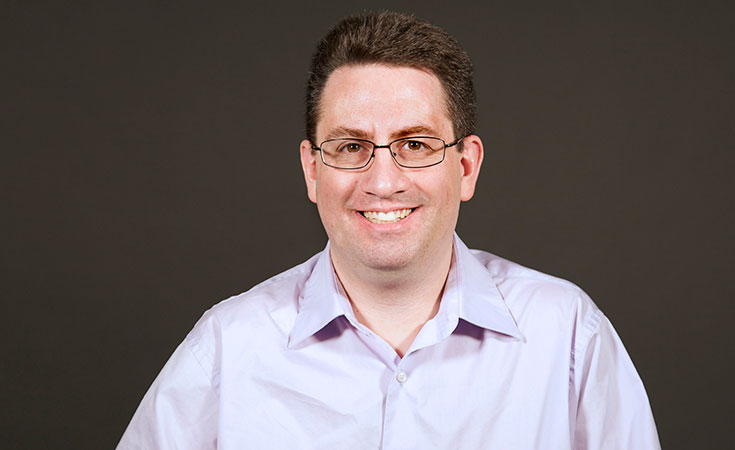Andrew Karatjas
Professor and Department Chair
JWU Faculty Since 2015

After being heavily influenced by the education he received at Haverford College, Andrew Karatjas pursued his Ph.D. at Pennsylvania State University with a goal of teaching at the undergraduate level.
Since 2006, Karatjas has taught a variety of chemistry courses while focusing on organic chemistry. With a background in organic synthesis and methodology, he has done research in the methodology of indoles and related natural products as well as hydroboration methodology.
More recently, Karatjas has developed a focus on chemical education research, specifically in looking at student self-assessment and how that affects performance in courses.
Most of his work has focused around student learning and looking for ways to improve student learning. As an organic chemist, he often teaches what is regarded as one of the most difficult courses that students take.
Too often, organic chemistry is thought of (and presented) dryly and has gained a stereotype as a class used to “weed out” pre-med students. Karatjas has developed a teaching style that emphasizes more than just rote memorization. Students need to be encouraged to think critically by applying familiar mechanisms to new situations.
For example, when he teaches organic reactions, he presents the material organized by reaction mechanisms. Karatjas emphasizes to students that memorization will only take them so far in the course. When he teaches the chapter on nucleophilic acyl substitution, he makes sure students realize that while this chapter has more than 20 reactions, most of the reactions use two general mechanisms. Therefore he attempts to get students to learn reactions by mechanisms and not memorization as it will allow them to apply what they have learned to new reactions.
By challenging the students in this way, it is Karatjas’ hope that students can transfer this learning to other situations (whether school related or not).
Through different strategies in the classroom as well as his research in chemical education, Karatjas’ students are well prepared for their future coursework and careers of choice.
Education
- Ph.D., Chemistry, Pennsylvania State University
- B.S., Chemistry, Haverford College
Scholarly Interests
Study of Student Self-Perception in Chemistry Courses
Organic Synthesis
Courses
- CHM 2011: Organic Chemistry I
- CHM 2016: Organic Chemistry I Laboratory
- CHM2050: Introduction to Organic Chemistry
- CHM 2022: Organic Chemistry II
- CHM 2026: Organic Chemistry II Lab
- CHM1000: Foundations in Chemistry
Professional Affiliations
The American Chemical Society, 1999–present
National Science Teachers Association, 2015–present
Publications
- Webb, J.A.; Karatjas, A.G., Grade Perception of Students in a Chemistry Program, Chemistry Education Research and Practice, 2018, 19, 491-499.
- Karatjas, A.G., Student Self-Assessment of Exam Preparation in 100 and 200-Level Chemistry Courses. Journal of College Science Teaching, 2024, 53, 121-128.
- Karatjas, A. G. The Use of iSpartan in Teaching Organic Spectroscopy. J. Chem. Educ. 2014, 91, 937–938.
- Karatjas, A. G. Use of student self-assessment of exams to investigate student learning in organic chemistry classes. In Innovative Uses of Assessments for Teaching and Research; Eds. Lisa Kendhammer and Kristen Murphy; ACS Symposium Series; Oxford University Press: Washington DC, 2014; Vol. 1182, pp 133–143.
- Karatjas, A. G.; Webb, J. A. The Role of Gender in Grade Perception in 100-Level Chemistry Courses. The Journal of College Science Teaching, 2015, 45, 24–29.
- Karatjas, A. G.; McBriarty, H. A.; Braye, S. I.; Piscitelli, D. A. Synthesis of Pinacolboranes. In Boron Reagents in Synthesis.; Ed. Adiel Coca; ACS Symposium Series; Oxford University Press: Washington DC, 2016; Vol. 1236, pp 227–240.
- Karatjas, A. G.; Webb, J. A. The Role of Student Major in Grade Perception in Chemistry Courses. The International Journal for the Scholarship of Teaching and Learning, 2017, 11 (2), Article 14.